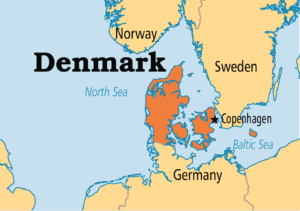OLD TESTAMENT READING- 1 Samuel 2:22-4:22
Samuel had the benefit of a godly mother.
- Hannah was a worshiper. Both Hannah and her husband modeled their devotion to God with regular participation in worship. Together they would go up to Shiloh to worship (1 Sam 1:3,9).
- Hannah loved her husband and was loved by him. This is an important factor in raising godly children. Marriage is designed to reflect the love of the Godhead. In the primitive society in which the Judges ruled, Elkanah made the mistake that so many did at that time. He practiced polygamy to raise a household of descendants. This was a practice contrary to God’s design for marriage (Genesis 2:24; Matthew 19:4-6), and it was never condoned by the Lord. In the law, God forbade the adoption of this pagan practice when giving instruction to kings:
Deuteronomy 17:17 17 “He shall not multiply wives for himself, or else his heart will turn away; nor shall he greatly increase silver and gold for himself.
Nevertheless, Elkanah loved Hannah and publicly made known that he favored her by giving her a double portion of the take-home food from the sacrifices (1 Samuel 1:5).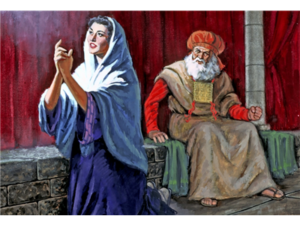
- Hannah pursued the Lord with passion. Both Elkanah and young Samuel would know what Hannah felt about things. She was that kind of woman. We read about her spiritual sensitivity- she was troubled in spirit, poured out her soul, experienced vexation, and wept bitterly as she prayed. She was deeply distressed. She did not hide her emotions.
- Hannah was a woman of prayer. Her prayer is described as an act of ‘pouring out her soul before the Lord’. In prayer, she would ‘speak her heart.’
- Hannah was a woman of faith. She received the blessing that was mediated by Eli, the priest, taking it to heart by faith. She took God at His Word.
1 Samuel 1:18b 18 So the woman went her way and ate, and her face was no longer sad.
- Hannah was faithful to nurture Samuel to live in the presence of the Lord.
 1 Samuel 1:22 22 that he may appear before the LORD and stay there forever.
1 Samuel 1:22 22 that he may appear before the LORD and stay there forever.
- Hannah had a vision for Samuel to become all that God would have him to be. She was willing to sacrifice to prepare him for this. Not only did she nurture him until he was ready to be weaned, but she prepared clothing for him, tailoring a new ephod to accommodate his growth from year to year.
 The Lord looked upon Hannah with favor. Eli blessed her in prayer: “May the Lord give you children.” God answered that prayer and Samuel would have three brothers and two sisters by Hannah, in addition to all the other half brothers and sisters by Peninnah.
The Lord looked upon Hannah with favor. Eli blessed her in prayer: “May the Lord give you children.” God answered that prayer and Samuel would have three brothers and two sisters by Hannah, in addition to all the other half brothers and sisters by Peninnah.
Notice the contrast in the parenting practices exhibited by Hannah and Eli. Mark the differences between Hannah’s proactive preparation of Samuel with Eli’s permissiveness towards his wayward sons.
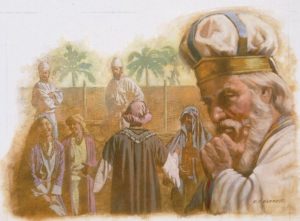 Eli’s sons served in the tabernacle “but did not know the Lord” (2:12). The sons selfishly took the portion of the sacrifices that belonged to the Lord, including the fat, to themselves. They were overly familiar with the things of God and had no reverential fear of the Lord. They lived for their own pleasure, seeking to satisfy their lustful appetites. They were seducing and sexually assaulting women who were serving at the Tent of Meeting. Their misbehavior was known but not addressed. Eli “kept hearing” these reports without correcting his sons with godly discipline.
Eli’s sons served in the tabernacle “but did not know the Lord” (2:12). The sons selfishly took the portion of the sacrifices that belonged to the Lord, including the fat, to themselves. They were overly familiar with the things of God and had no reverential fear of the Lord. They lived for their own pleasure, seeking to satisfy their lustful appetites. They were seducing and sexually assaulting women who were serving at the Tent of Meeting. Their misbehavior was known but not addressed. Eli “kept hearing” these reports without correcting his sons with godly discipline.
Eli knew his sons’ practice of iniquity- – that “they were blaspheming God.” “He did not restrain them.” (3:13).
Eventually, Eli rebukes his sons, but it is too late, and they do not listen (2:25).
A man of God comes to Eli and holds him accountable for the scorn shown by his sons to the sacrifices and service of the tabernacle. Eli’s culpability is evident in that he himself has become fat by eating the choicest parts of the people’s sacrifices and turning a blind eye to his sons’ self-indulgent lifestyle (2:27-29).
This does not mean that the parents are always to blame for the misbehavior of their offspring. But it does emphasize the important responsibility of the parent to set an example of godly living and to bring their children up in the nurture, discipline, and instruction of the Lord.
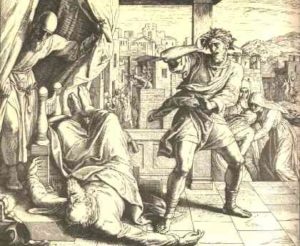 Ephesians 6:4 4 Fathers, do not provoke your children to anger, but bring them up in the discipline and instruction of the Lord.
Ephesians 6:4 4 Fathers, do not provoke your children to anger, but bring them up in the discipline and instruction of the Lord.
The man of God predicts the downfall of the house of Eli, that his two sons, Hophni and Phinehas, would die on the same day and that Eli himself will die under his own unrighteously accrued weight! (1 Sam 4:18). There will not be an old man left in his household.
The man of God predicts that as the house of Eli is deposed in judgment, God will raise up a faithful priest. This prophecy refers, in an immediate sense, to Samuel, but it is also a Messianic prophecy pointing to the eternal priesthood of Christ:
1 Samuel 2:35 35 But I will raise up for Myself a faithful priest who will do according to what is in My heart and in My soul; and I will build him an enduring house, and he will walk before My anointed always.
The Lord calls Samuel to serve as a prophet while he is still a young boy.
Notice the description of the times as we begin reading Chapter 3.
- Disobedience was rampant in Israel.
- Eli, the priest, had fattened himself in the Lord’s service and was negligent in the communication of God’s Word.
- Eli was physically blind. The people were spiritually blind.
“The word of the Lord was rare in those days; there was no frequent vision.” (1 Sam 3:1).
This is a great warning for us as disciples of Christ to “continue in the Word.” Keep listening. Keep obeying. Keep your eyes on Jesus. And maintain your relationship as a doer of His Word, not a hearer only.
John 8:31-32 31 So Jesus was saying to those Jews who had believed Him, “If you continue in My word, then you are truly disciples of Mine; 32 and you will know the truth, and the truth will make you free.”
God’s patience with the nation of Israel is evident in the merciful statement: “The lamp of God had not yet gone out.” This statement also highlights the fact that Eli was neglectful of his priestly duty to keep the lamp of God always burning brightly. This was the command of God (Exodus 27:20). The only light in the holy place of the tabernacle would be that which came from the seven-branched lampstand. Perhaps because of his own blindness, Eli was not aware of the dimness of light in the tabernacle.
 It is in this nearly extinguished light that God awakens Samuel and tunes the young boy’s ear to hear His voice by repeatedly calling him by name. Samuel hears the double appellation in the night, “Samuel, Samuel” (1 Sam 3:10). This double repetition of the called-out name emphasizes the vehemence and importance of the call. It reminds us of the significant call heard by the Apostle Paul when the risen Lord appeared to him on the road to Damascus, repeating his name, “Saul, Saul”; (Acts 9:4). It also reminds us of how the Lord sought to get the attention of Mary’s sister and to get her to focus on what is most important, saying, “Martha, Martha” (Luke 10:41). Or when Jesus warned Peter of his vulnerability to deception, “Simon, Simon, Satan demanded to have you, that he might sift you as wheat” (Luke 22:31).
It is in this nearly extinguished light that God awakens Samuel and tunes the young boy’s ear to hear His voice by repeatedly calling him by name. Samuel hears the double appellation in the night, “Samuel, Samuel” (1 Sam 3:10). This double repetition of the called-out name emphasizes the vehemence and importance of the call. It reminds us of the significant call heard by the Apostle Paul when the risen Lord appeared to him on the road to Damascus, repeating his name, “Saul, Saul”; (Acts 9:4). It also reminds us of how the Lord sought to get the attention of Mary’s sister and to get her to focus on what is most important, saying, “Martha, Martha” (Luke 10:41). Or when Jesus warned Peter of his vulnerability to deception, “Simon, Simon, Satan demanded to have you, that he might sift you as wheat” (Luke 22:31).
Samuel, out of habit, responds as a servant to his master, mistaking the Lord’s voice for Eli’s. It is easy to mistake the voice of a man for the voice of God if you have become accustomed to the words of men and are unaccustomed to the Word of God. Eli gradually recognizes that it must be the Lord calling Samuel, and so he instructs Samuel to respond to God’s call directly, answering Him with a yielded heart that says, “Speak Lord, for your servant hears.”
God then speaks to Samuel, informing him of the severe judgment that He is going to bring to punish the house of Eli forever because of “the iniquity that he knew and he did not restrain his sons from blaspheming God.”
At first, Samuel is frightened to tell this news to Eli, but Eli coaxes him to share the Word of the Lord. Samuel exhibits the faithfulness of a prophet. “So Samuel told him everything and hid nothing from him.”
Eli responds with contrite recognition, “It is the Lord. Let him do what seems good to him” (3:18).
Samuel begins his ministry of the Word. “The Lord revealed Himself to Samuel at Shiloh by the Word of the Lord.”
It is the same with us. The Lord reveals Himself to us through His Word.
THE ARK OF THE COVENANT IS CAPTURED.
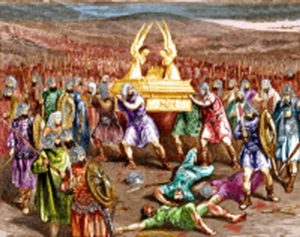 The Philistines defeat the Israelites, four thousand men dying on the battlefield at Ebenezer (meaning ‘up until now the Lord has helped us’). When the Israelites discuss their defeat, they do not ask the Lord for an explanation. Instead, they bring the ark of the covenant as their good luck charm.
The Philistines defeat the Israelites, four thousand men dying on the battlefield at Ebenezer (meaning ‘up until now the Lord has helped us’). When the Israelites discuss their defeat, they do not ask the Lord for an explanation. Instead, they bring the ark of the covenant as their good luck charm.
The Israelites cheer the idea with great enthusiasm and thunderous shoutings. The enemy, hearing the noise of the shouting and learning that the Israelites were bringing the ark with them into battle, become afraid and presume their own doom.
However, to their surprise, the Israelites are defeated by the Philistines, with another 30,000 perishing in the battle. The ark of the covenant is captured, the sons of Eli are killed. Eli, now 98 years old, when he hears the news, falls over backward from his seat by the side of the gate, breaks his neck, and dies.
His daughter-in-law goes into labor when she hears the news of the death of her father-in-law, Eli, and her husband, Phinehas. She dies giving birth to a son, who is symbolically named to mark this moment in history, ‘Ichabod,’ meaning, “The glory of God has departed.”
NEW TESTAMENT READING: John 5:24-47
We start with a verse worthy of memorization. These are the words of Jesus, the Son of God:
John 5:24 24 “Truly, truly, I say to you, he who hears My word, and believes Him who sent Me, has eternal life, and does not come into judgment, but has passed out of death into life.”
 Jesus affirms His claim to be the Son of Man spoken of in the Book of Daniel (Daniel 7:13). He asserts the astonishing claim of His authority to rescue the faithful, execute judgment and call all the dead from their tombs to the resurrection unto eternal life or judgment (The white throne judgment).
Jesus affirms His claim to be the Son of Man spoken of in the Book of Daniel (Daniel 7:13). He asserts the astonishing claim of His authority to rescue the faithful, execute judgment and call all the dead from their tombs to the resurrection unto eternal life or judgment (The white throne judgment).
John 5:28-29 28 “Do not marvel at this; for an hour is coming, in which all who are in the tombs will hear His voice, 29 and will come forth; those who did the good deeds to a resurrection of life, those who committed the evil deeds to a resurrection of judgment.”
Daniel 12:2 2 “Many of those who sleep in the dust of the ground will awake, these to everlasting life, but the others to disgrace and everlasting contempt.”
The Jewish leaders were already seeking to kill Him (John 5:18). Jesus does not back down from His claim of divine authority. He claims to have greater authority than Moses.
Not only does Jesus affirm Moses as the author of the Torah, but He also claims that the Torah prophetically speaks of Him. He claims to be the chief subject of the Torah and, therefore, the key to its interpretation.
 John 5:39-40 39 “You search the Scriptures because you think that in them you have eternal life; it is these that testify about Me; 40 and you are unwilling to come to Me so that you may have life.”
John 5:39-40 39 “You search the Scriptures because you think that in them you have eternal life; it is these that testify about Me; 40 and you are unwilling to come to Me so that you may have life.”
John 5:45-46 45 “Do not think that I will accuse you before the Father; the one who accuses you is Moses, in whom you have set your hope. 46 For if you believed Moses, you would believe Me, for he wrote about Me.”
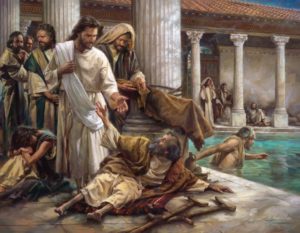 In this statement, Jesus underscores the authority of the books of Moses as the written Word of God by which we will be judged. He also shows that the intent of the law is to reveal Christ and our need for Him.
In this statement, Jesus underscores the authority of the books of Moses as the written Word of God by which we will be judged. He also shows that the intent of the law is to reveal Christ and our need for Him.
In this chapter, Jesus is giving clear testimony that He is the one who fulfills the Messianic prophecies of the Old Testament.
- He healed the lame man (John 5:9)
Isaiah 35:6 6 Then the lame will leap like a deer, And the tongue of the mute will shout for joy. For waters will break forth in the wilderness and streams in the Arabah.
He affirms His Messiahship when He says:
John 5:20 20 “For the Father loves the Son, and shows Him all things that He Himself is doing; and the Father will show Him greater works than these, so that you will marvel.
- He is ‘the Son of Man’ prophesied in the Book of Daniel
Daniel 7:13-14 13 “I kept looking in the night visions, and behold, with the clouds of heaven One like a Son of Man was coming, And He came up to the Ancient of Days And was presented before Him. 14 And to Him was given dominion, Glory and a kingdom, that all the peoples, nations and men of every language Might serve Him. His dominion is an everlasting dominion Which will not pass away; And His kingdom is one Which will not be destroyed.”
Jesus claims to be this Son of Man:
John 5:26-27 26 “For just as the Father has life in Himself, even so He gave to the Son also to have life in Himself; 27 and He gave Him authority to execute judgment, because He is the Son of Man.’
- Jesus claims to be Almighty God, having the authority over life and death.
Deuteronomy 32:39 39 ‘See now that I, I am He, and there is no god besides Me; It is I who put to death and give life. I have wounded and it is I who heal, and there is no one who can deliver from My hand.’
1 Samuel 2:6 6 “The LORD kills and makes alive; He brings down to Sheol and raises up.”
2 Kings 5:7 7 When the king of Israel read the letter, he tore his clothes and said, “Am I God, to kill and to make alive, that this man is sending word to me to cure a man of his leprosy? But consider now, and see how he is seeking a quarrel against me.”
Jesus fulfills this prophecy by raising the dead (the widow’s son, Jairus’ daughter, Lazarus). He proclaims:
John 5:21 21 “For just as the Father raises the dead and gives them life, even so the Son also gives life to whom He wishes.”
John 5:25 25 “Truly, truly, I say to you, an hour is coming and now is, when the dead will hear the voice of the Son of God, and those who hear will live.”
Rather than recognizing that Jesus fulfilled these clear Messianic prophecies, the religious leaders choose to suppress the truth, reject Him, and plot to kill Him.
TODAY’S READING FROM THE BOOK OF PSALMS
PSALM 106:1-12;
The Psalmist invites us to praise the Lord for His mercies. He cites many examples of Israel’s unfaithfulness, and yet God mercifully intervenes.
Psalm 106:7-8 7 Our fathers in Egypt did not understand Your wonders; They did not remember Your abundant kindnesses, but rebelled by the sea, at the Red Sea. 8 Nevertheless He saved them for the sake of His name, That He might make His power known.
And the Lord did make His power known by saving them from their foes and destroying their enemies, so not one of Pharaoh’s pursuing army was left.
After seeing these works, God’s people believed His words and then sang His praise (See Exodus 15- The Song of Moses).
PROVERBS 14:30-31
 Proverbs 14:30-31 30 A tranquil heart is life to the body, but passion is rottenness to the bones. 31 He who oppresses the poor taunts his Maker, but he who is gracious to the needy honors Him.
Proverbs 14:30-31 30 A tranquil heart is life to the body, but passion is rottenness to the bones. 31 He who oppresses the poor taunts his Maker, but he who is gracious to the needy honors Him.
It is true that a heart established in the peace of God delivers the body from the destructive influences of undue stress. It is important that we learn to be content with Christ as the content of our contentment. This is life and health to your spirit, soul, and body.
1 Thessalonians 5:23 “Now may the God of peace Himself sanctify you entirely; and may your spirit and soul and body be preserved complete, without blame at the coming of our Lord Jesus Christ.”
On the other hand, to be given to your own passions, envy, and discontent will bring a toll on your body.
How a person treats the poor displays their faith in the Creator. Do you believe that every human being is an image-bearer of God, even though that image has been marred by sin? We honor our Creator by respecting their God-given dignity and being gracious and generous to them.
PRAYER FOR THE NATIONS (from “Operation World” p. 302-303)
Today we pray for Denmark.
Area: 43,092 sq. km
 The most southerly of the Scandinavian countries. See separate entries for Faeroe Islands and Greenland, which are autonomous regions of Denmark.
The most southerly of the Scandinavian countries. See separate entries for Faeroe Islands and Greenland, which are autonomous regions of Denmark.
Population: 5,481,283 Annual Growth: 0.24%
Capital: Copenhagen
Urbanites: 87.2%
HDI Rank: 16 of 182 (UN Human Development Reports 2009)
Peoples
Peoples: 32 (25% unreached)
Official language: Danish Languages: 13
Religion
Largest Religion: Christian
|
Religion |
|
Pop % |
Ann Gr |
|
4,674,986 |
85.29 |
-0.2 |
|
|
193,344 |
3.5 |
0.2 |
Challenges for Prayer
Old non-missional theologies are devastating for the Church since they fail to equip the Church with effective discipleship and mission in a secular realm. Pray for theological and missional renewal in all seminaries and Bible schools that will encourage a vibrant mission’s vision. Pray also for leaders to be raised up who are able to communicate Christ with the Danish postmodern youth culture.
There is a shortfall of pastors, especially for Free Churches of all types. Even with a number of fresh and new ministries and church planting efforts, many evangelical congregations, especially those without a pastor, are in stagnation or even decline. Pray for the provision of capable, godly leaders and for the revitalization of these evangelical congregations.
New generations seek new and more meaningful ways to be involved with missions internationally. Pray that attempts in tentmaking ministry will be fruitful, and pray that mission among the many migrants in Denmark will gain momentum.
PRAYER: Gracious God, You have called us to life through Your Word! We believe His claims and trust His testimony as Son of God and Son of Man. Thank you for giving us ears to hear. We are grateful for all those who have nurtured our spiritual growth and have had a vision to equip us for future ministry. As we approach Mother’s Day, we thank you for mothers who have cared for us, especially for those who provided nurture and discipline and have pointed us to Christ. Help us to make disciples who will in turn make more disciples who bring forth the fruit of the Spirit, in Jesus’ Name. Amen.
-Pastor David

